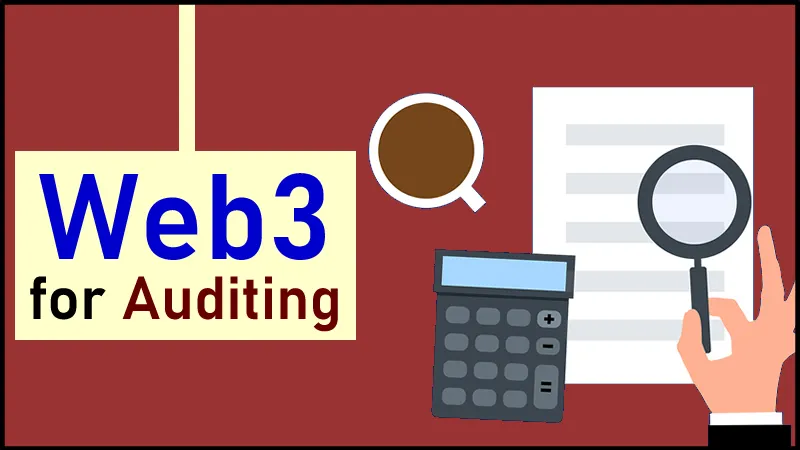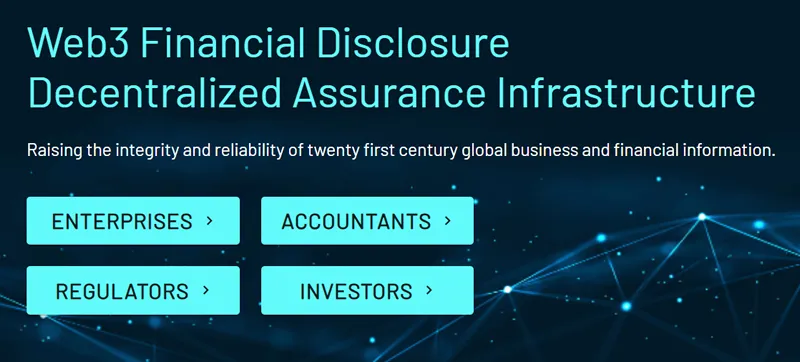

introduction
Web3 through blockchain technology has the potential to disrupt many established systems and industries. While it is still at a growth stage with many challenges, it still remains the best technology upgrade for many financial systems. One such system where blockchains could be put to great use is in financial auditing at the enterprise level.
Financial auditing today has left so much to be desired. Blockchain technology will use many of its features such as immutability, transparency and data security to ensure a fair and reputable audit process that merits general trust and integrity. Before we see how all these is possible, lets quickly look at some known challenges of modern financial auditing.

Enterprise financial auditing - the challenges
Auditing business finances have come with so many challenges today. Consider the following two:
1. Inaccurate financial data: Auditors rely on the data provided in order to evaluate the financial state of a business and make decisions. This data must be provided by the business or firm. Some businesses manipulate their financial data and submit figures that are not accurate at all. When this happens, it could lead to a series of challenges in auditing.
Misleading financial records submitted for auditing could result in wrong conclusions from the auditors. Such data might make it difficult for auditors to identify financial loopholes in the organization. These might have far more tragic consequences in the future for the finances of that business.
For industries that require a business to meet up to some certain levels of financial compliance, wrong data submitted for auditing might make it difficult to determine if their finances meet the standard. This is often a common practice in the enterprise world. Businesses hope that auditors will not find out the true state of their finances and regulatory compliance by providing bogus data and inflated figures for their finances.
2. Compromised auditor: Another popular practice is the buying over of auditors. There are bad actors in the auditing industry and these are ready to close eye to financial wrongdoing if some incentives were offered. Having accepted bribes, the auditor might not report all the inadequacies noted in the business financing. Or they might minimize the scale of financial misdeeds or even modify some records when making their reports.
When auditors act in a bad manner by not being transparent in their process, they might endanger the long-term financial state of the organization and prevent them from doing the right things in finance to stay in business.
The above some of the many challenges of modern auditing in the enterprise world. Blockchains offer far more superior solutions to challenges faced in auditing.

Web3 for enterprise auditing
Blockchain, through web3 offers lots of amazing benefits for enterprise auditing. Consider the following benefits:
- Data integrity: When auditors are done with their work, they leave behind audit trails which are valid documents to verify the auditing process. Such data could be used in many aspects of the business world. Data integrity is all but guaranteed when they are stored on the blockchain. This makes such data tamper-proof and authentic.

When data trails are stored on the blockchain, it inherits the immutable feature of blockchains. Such data is impossible to manipulate in any form. It cannot be edited, deleted or modified. When such data is presented in the future such as during legal procedures or other times, there is maximum trust in the data provided. Everyone that uses the trail is sure that the data provided is authentic and free from manipulation. Only blockchain-based auditing can guarantee such trust.
- Automation with smart contracts: Todays auditing procedures are so manual and time-wasting. Blockchain offers a way to automate most of the processes through smart contracts. Smart contracts play a crucial role in auditing automation. Repetitive processes could be coded into smart contracts. Such processes might include checking recurring payment receipts, cross-checking figures in documents and performing basic arithmetic's based on inputs.
The use of smart contracts save a lot of time and man power. This generally reduces the overall amounts of time spent in the auditing process and guarantees a more reliable outcome. Smart contracts also reduces human error which is usually noted in manual auditing. As such, the final results submitted by auditors is more accurate in blockchain-based financial auditing.
- Transparency of auditing processes: The blockchain stores data in open ledgers that can be monitored and seen by everyone. The use of blockchain technology for auditing greatly reduces - if not entirely eliminates - chances of manipulation by auditors. As the various steps and stages of the auditing is publicly available to all parties, bad actors find it difficult to modify records, hide data or inflate figures.
Transparency is badly lacking in current auditing models and this makes it easier for auditors to be bought over. But with transparency guaranteed using blockchain technology, auditing process are watched and bad actors have little chances of playing tricks.
- Privacy of sensitive financial records: While there is transparency in using blockchain for auditing, it also guarantees privacy. Not all financial records should be made public. Because some records are sensitive in nature, blockchain also provides a way to hide such data using encryption and cryptographic hash.
The auditors would receive permission from the organization on which records to make private. Blockchain encryption would be used to hide sensitive data and only authorized parties would be given decryption keys to access such data. In this way, sensitive financial records are kept away from public eye, while making other records accessible too. Only blockchain technology could guarantee that.
The above represent some of the benefits and more of using blockchain technology to perform audits. The question now is: Are there web3 auditing firms out there? Well there are.

Auditchain - decentralized auditing Protocol

Auditchain is one of the many web3 auditing platforms for enterprises. The project integrates many tools such as accounting protocols and AI to ensure that every project no matter the size and scope could find their web3 auditing platform efficient.
Here are a few features of the Auditchain platform
Luca: One big challenge in web3 auditing is how to present digital records from the audit processes. The Luca set of tools ensures that data is presented in forms that are suitable for its nature. Public data could be made public and sensitive records are encrypted. The tools includes accounting protocols to ensure that financial account is handled in-house.
Pacioli: Another big feature is is pacioli which handles most of the financial accounting. The use of AI technologies and standard accounting procedures ensures an accurate rendering of financial records. Pacioli ensures that standard regulatory requirements like CEAOB could be fulfilled by the businesses being audited. In addition, everything is decentralized and there is no intermediary auditing firms or processes involved.
You could use the resource links below to find more information about Auditchain.
Conclusion
Web3 and blockchain revolution is the future of enterprise auditing. Everything is done better here. Transparency of processes are guaranteed. Audit trails remain immutable and authentic. Automation of processes enhances speed, reduces cost and human error, and ensures there are no intermediaries.
Even though there will be challenges along the way, blockchain technology remains the best option to deliver accurate and swift auditing for all businesses.